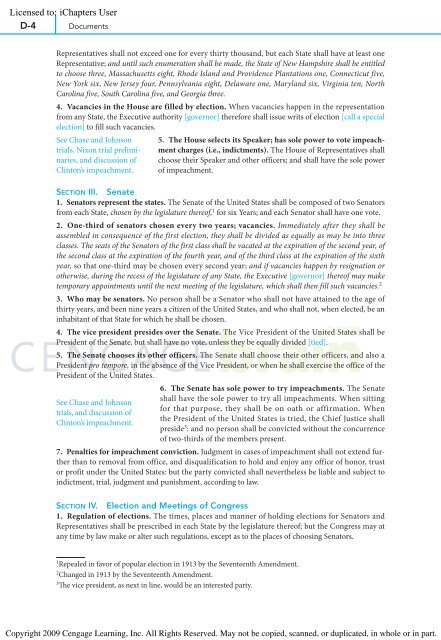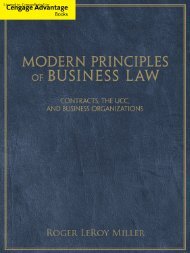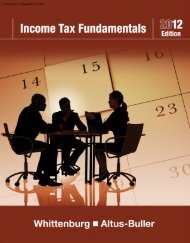03469_00_FM_pi-xxxii pp2.indd - CengageBrain
03469_00_FM_pi-xxxii pp2.indd - CengageBrain
03469_00_FM_pi-xxxii pp2.indd - CengageBrain
Create successful ePaper yourself
Turn your PDF publications into a flip-book with our unique Google optimized e-Paper software.
Licensed to:<br />
D-4 Documents<br />
Representatives shall not exceed one for every thirty thousand, but each State shall have at least one<br />
Representative; and until such enumeration shall be made, the State of New Hampshire shall be entitled<br />
to choose three, Massachusetts eight, Rhode Island and Providence Plantations one, Connecticut five,<br />
New York six, New Jersey four, Pennsylvania eight, Delaware one, Maryland six, Virginia ten, North<br />
Carolina five, South Carolina five, and Georgia three.<br />
4. Vacancies in the House are filled by election. When vacancies happen in the representation<br />
from any State, the Executive authority [governor] therefore shall issue writs of election [call a special<br />
election] to fill such vacancies.<br />
See Chase and Johnson<br />
trials, Nixon trial preliminaries,<br />
and discussion of<br />
Clinton’s impeachment.<br />
5. The House selects its Speaker; has sole power to vote impeachment<br />
charges (i.e., indictments). The House of Representatives shall<br />
choose their Speaker and other officers; and shall have the sole power<br />
of impeachment.<br />
SECTION III. Senate<br />
1. Senators represent the states. The Senate of the United States shall be composed of two Senators<br />
from each State, chosen by the legislature thereof, 1 for six Years; and each Senator shall have one vote.<br />
2. One-third of senators chosen every two years; vacancies. Immediately after they shall be<br />
assembled in consequence of the first election, they shall be divided as equally as may be into three<br />
classes. The seats of the Senators of the first class shall be vacated at the ex<strong>pi</strong>ration of the second year, of<br />
the second class at the ex<strong>pi</strong>ration of the fourth year, and of the third class at the ex<strong>pi</strong>ration of the sixth<br />
year, so that one-third may be chosen every second year; and if vacancies happen by resignation or<br />
otherwise, during the recess of the legislature of any State, the Executive [governor] thereof may make<br />
temporary appointments until the next meeting of the legislature, which shall then fill such vacancies. 2<br />
3. Who may be senators. No person shall be a Senator who shall not have attained to the age of<br />
thirty years, and been nine years a citizen of the United States, and who shall not, when elected, be an<br />
inhabitant of that State for which he shall be chosen.<br />
4. The vice president presides over the Senate. The Vice President of the United States shall be<br />
President of the Senate, but shall have no vote, unless they be equally divided [tied].<br />
5. The Senate chooses its other officers. The Senate shall choose their other officers, and also a<br />
President pro tempore, in the absence of the Vice President, or when he shall exercise the office of the<br />
President of the United States.<br />
See Chase and Johnson<br />
trials, and discussion of<br />
Clinton’s impeachment.<br />
6. The Senate has sole power to try impeachments. The Senate<br />
shall have the sole power to try all impeachments. When sitting<br />
for that purpose, they shall be on oath or affirmation. When<br />
the President of the United States is tried, the Chief Justice shall<br />
preside 3 : and no person shall be convicted without the concurrence<br />
of two-thirds of the members present.<br />
7. Penalties for impeachment conviction. Judgment in cases of impeachment shall not extend further<br />
than to removal from office, and disqualification to hold and enjoy any office of honor, trust<br />
or profit under the United States: but the party convicted shall nevertheless be liable and subject to<br />
indictment, trial, judgment and punishment, according to law.<br />
SECTION IV. Election and Meetings of Congress<br />
1. Regulation of elections. The times, places and manner of holding elections for Senators and<br />
Representatives shall be prescribed in each State by the legislature thereof; but the Congress may at<br />
any time by law make or alter such regulations, except as to the places of choosing Senators.<br />
1 Repealed in favor of popular election in 1913 by the Seventeenth Amendment.<br />
2 Changed in 1913 by the Seventeenth Amendment.<br />
3 Th e vice president, as next in line, would be an interested party.<br />
Copyright 2<strong>00</strong>9 Cengage Learning, Inc. All Rights Reserved. May not be co<strong>pi</strong>ed, scanned, or duplicated, in whole or in part.










